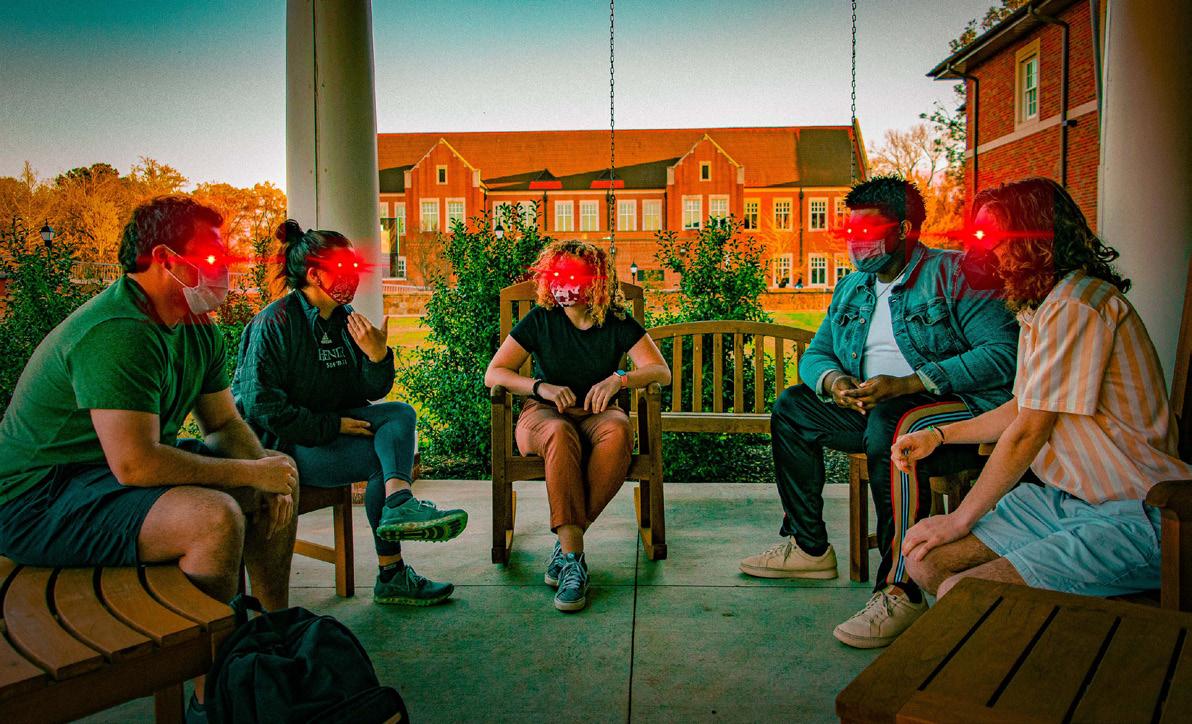
4 minute read
Looming Legislation
from The Fool-Proof Issue
by The Profile
A rundown of recent changes and what they mean for Arkansans
Sophie O’Reilly|Staff Writer Roth Coats|Fact Checker
Advertisement
In the past few weeks, a variety of bills that target abortion and LGBTQ+ Arkansans have been passed in the Arkansas Legislature. The text of each of these bills is long and complicated, but in reality have simple yet severe outcomes. We’ve summarized each of these bills and acts below in order to give you a better sense of what they mean and what kind of impact they could have on you or the people you know. In any case, we want to provide a base from which you can draw informed opinions and a heightened sense of empathy for those most at-risk from this legislation.
Act 462 Medical Ethics and Diversity Act
This act enables medical practitioners to deny medical treatment if it conflicts with their conscience. For the purposes of the bill, conscience is defined as religious, moral, or ethical beliefs. There are two important caveats in this bill: 1. This exemption does not apply to “emergency treatment” 2. This exemption does apply if the treatment is considered “medically necessary” Here are some basic examples of things that are now legal because of this act:
A doctor or pharmacist could deny PrEP to a gay man because being gay “conflicts with their beliefs.” Similarly, a pharmacist could deny filling a prescription for a woman’s insulin because the patient has a wife.
For transgender folks, this act limits access to resources with which to medically transition along with non-transition related medical care for LGBTQ+ people. Folks who have had the same doctor for years could need to find a new one. Already controlled medications such as hormone replacement therapy (HRT) could be only available at a few pharmacies that have non-conflicted pharmacists.
Act 626 Save Adolescents From Experimentation (SAFE) Act
This act attempts to prevent minors from accessing any form of medical transition, including puberty blockers. Gender re-affirming surgeries for youth are relatively rare, but puberty blockers are more common. Blockers pause the effects of puberty and are physically reversible and safe according to various pediatric boards. Puberty blockers are not exclusive to transgender youth either. Additionally, this bill doesn’t limit uses of puberty blockers for cisgender children. Other kinds of HRT (for transitioning) have been banned for adolescents as well.
Act 461 The Fairness in Women’s Sports Act
This act is fairly straightforward. The act claims that because of “unfair advantages” in sports that come from being assigned male at birth, transgender women should not be allowed to participate in women’s athletics. A similar bill recently died in Florida over concerns surronding how sex would be verified.
Senate Bill 6: A Ban on Abortion for Arkansans
On March 6th, 2021, Arkansas Governor Asa Hutchinson approved Senate Bill 6, which institutes stringent abortion legislation for Arkansas citizens. The only exceptions the legislation provides is for instances wherein the mother or the child’s life is severely threatened by the pregnancy. There are no exceptions for rape or incest, which goes against the grain of other Southern states’ abortion legislation. Gov. Hutchinson says he “would have preferred,” the legislation to include such exceptions, but ultimately, the legislation fulfills its intended purpose: to defy the US Supreme Court ruling on abortion. The goals of the bill are (1) to directly contradict Roe v. Wade, and (2) to have abortion reconsidered under the new, majority conservative Supreme Court. Pro-choice advocates, including the American Civil Liberties Union of Arkansas, say that they are ready to fight for “as long as it takes” to protect legal precedent for abortion nationwide. Legislation designed with the sole intention of overturning national statutes is a potentially treacherous path to embark on. While the rule of law isn’t always the best guiding force for moral decisions, a reruling of Roe v. Wade predicated purely on more conservative judges feels manipulative, especially after years of relatively accessible abortion services. Additionally, having no exceptions for rape and incest sends a silent message to predators that those actions will go unpenalized. Arkansas legislators need to protect vulnerable populations, and the lack of legal push-back on this ruling is disappointing and dangerous. On the subject of LGBTQ+ legislation, many politicians would lead you to believe that these acts come from a “feminist” place, but in reality the motivation is transphobia. This is the most obvious in 461. An athlete being taller or stronger because of genetics isn’t an “unfair advantage,” but being assigned male at birth is, according to this logic. If height and weight variations were truly the issue, this legislation would instead mandate something like height and weight classes for all sports. The other bills’ primary issues come from a prioritization of so-called “freedom’’ over the humanity and personhood of those seeking medical care. In many cases, the mental health benefits of transition care are life-saving. These bills go beyond inconveniences into actively harming Arkansans; the social and medical implications of a lack of choice, control, and security will cause extensive harm. At their core they are poorly researched, in bad faith, transphobic, misogynistic, and inherently an effort to control medical choices that should be autonomous.








